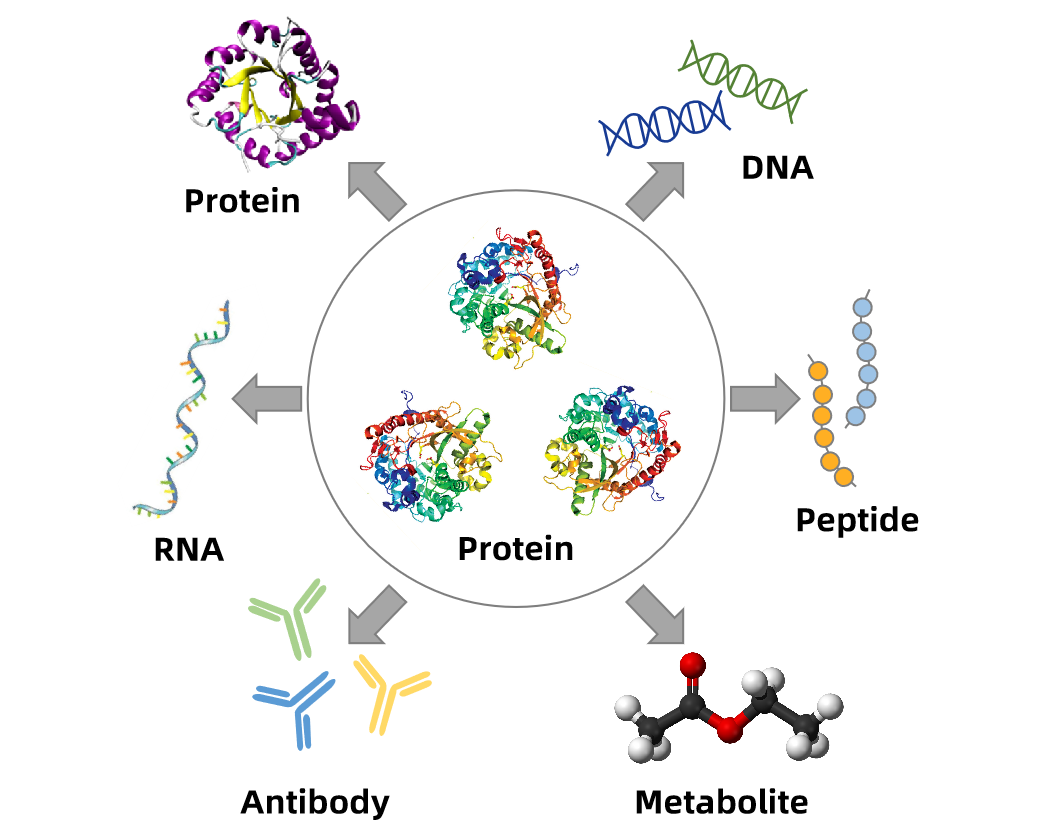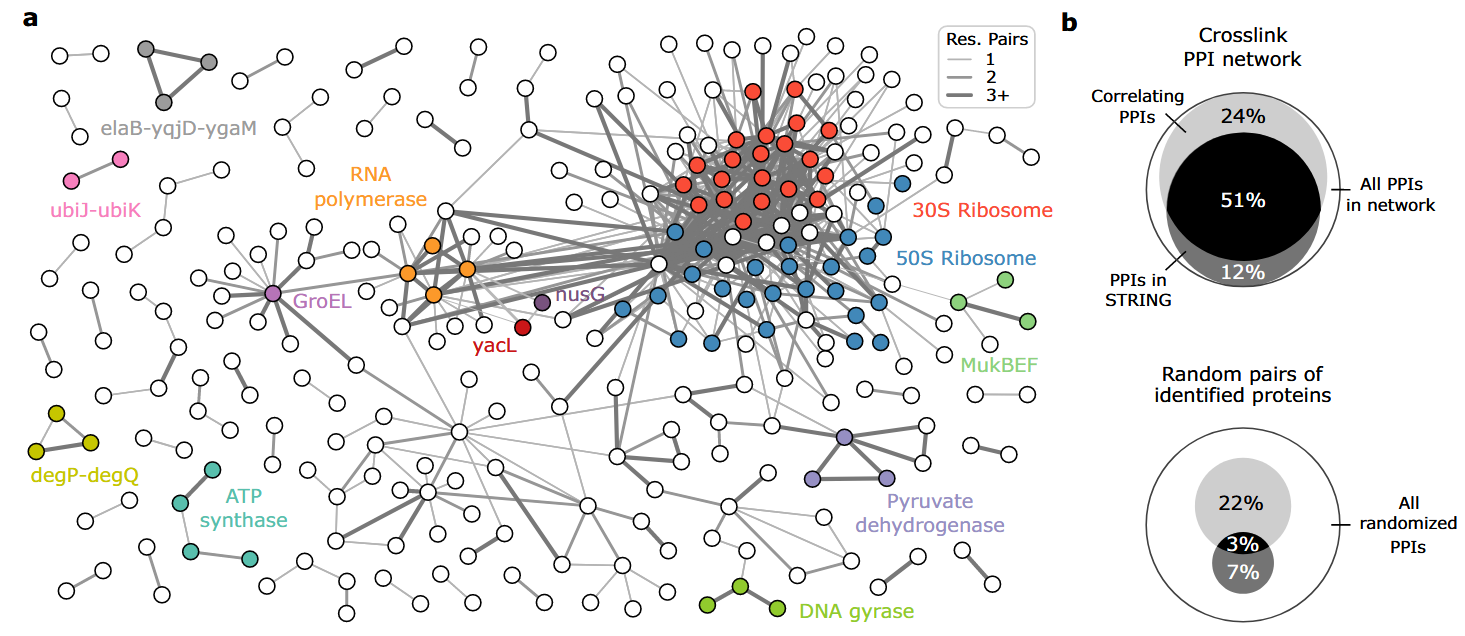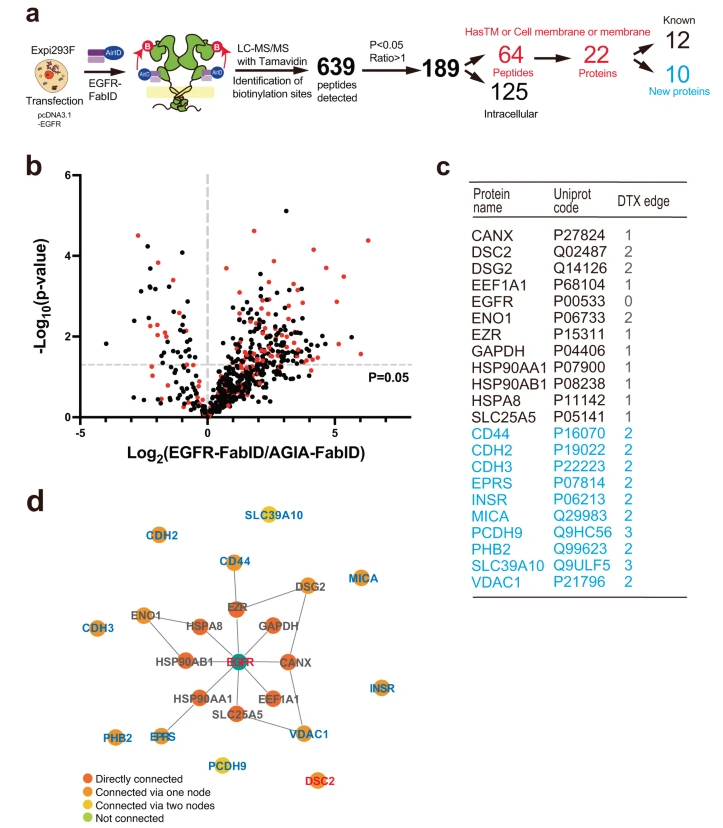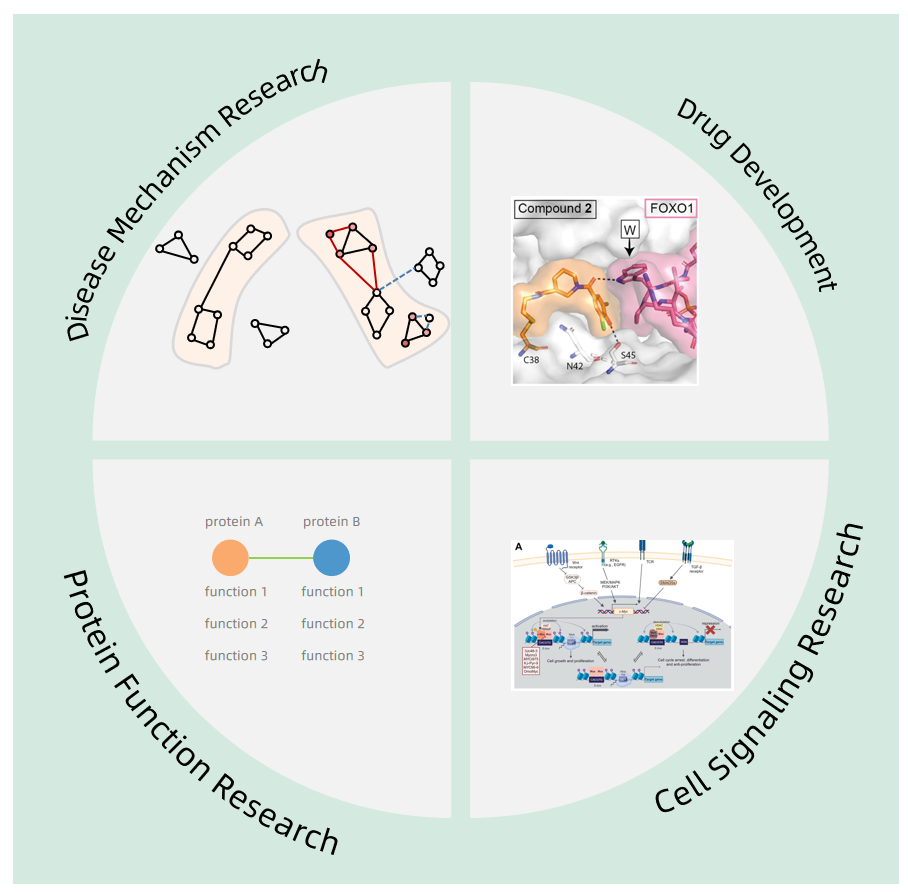Protein Interaction Analysis Service
- Protein-Protein Interaction Analysis Service
- Protein-Metabolite Interaction Analysis Service
- Protein-DNA Interaction Analysis Service
- Protein-RNA Interaction Analysis Service
Proteins are at the heart of virtually every biological process, orchestrating complex cellular functions through a vast network of interactions. Understanding these protein interactions is essential for elucidating cellular mechanisms, unraveling disease pathways, and identifying novel therapeutic targets. Proteins do not operate in isolation; they interact dynamically with other proteins, DNA, RNA, metabolites, and various biomolecules, forming intricate networks that regulate biological systems. At MtoZ Biolabs, we recognize the critical importance of deciphering these interaction networks. Our newly launched Protein Interaction Analysis Service leverages cutting-edge mass spectrometry and advanced proteomics technologies to provide comprehensive insights into protein interactions. Our expert team offers tailored solutions to meet your specific research needs.
Proteins are essential macromolecules that drive virtually every biological process within living organisms, including enzymatic catalysis, signal transduction, structural support, and immune responses. Their pivotal role in these processes highlights their importance in maintaining cellular function and overall organismal health. Protein interactions refer to the physical contacts and functional associations between proteins and other biomolecules, such as protein-protein interactions, protein-metabolite interactions, protein-DNA interactions, and protein-RNA interactions. Understanding these interactions is essential for unraveling the complexities of cellular mechanisms and advancing biomedical research.

Figure 1. Schematic of Interaction of Proteins with Biological Molecules
1. Protein-Protein Interactions
Protein-protein interactions (PPIs) form the backbone of cellular networks, influencing processes such as signal transduction, metabolic pathways, and structural organization. PPIs can be transient or stable, facilitating complex formation that regulates enzyme activity, gene expression, and intercellular communication. Studying PPIs provides insights into the functional architecture of the proteome and aids in identifying potential drug targets for various diseases. Common methods for studying protein-protein interactions include yeast two-hybrid screening (Y2H), co-immunoprecipitation (Co-IP), surface plasmon resonance (SPR), mass spectrometry-based approaches, protein microarrays, bimolecular fluorescence complementation (BiFC), GST-pull down, and more.
2. Protein-Metabolite Interactions
Proteins interact with metabolites—small molecules involved in metabolism—to regulate enzyme activity, metabolic flux, and cellular responses to environmental changes. Protein-metabolite interactions are vital for modulating protein function, stability, and localization. Analyzing these interactions enhances our understanding of metabolic regulation and can reveal biomarkers for metabolic disorders and other diseases.
3. Protein-DNA Interactions
Protein-DNA interactions are central to genetic information processing, including transcription, replication, repair, and chromatin remodeling. Proteins such as transcription factors and histones bind to DNA to control gene expression and maintain genome integrity. Investigating protein-DNA interactions is essential for deciphering gene regulatory networks and understanding epigenetic modifications that contribute to development and disease. Key methods for studying protein-DNA interactions include Chromatin Immunoprecipitation (ChIP), Electrophoretic Mobility Shift Assay (EMSA), DNA footprinting, Surface Plasmon Resonance (SPR), and more.
4. Protein-RNA Interactions
Protein-RNA interactions play a critical role in post-transcriptional regulation, affecting RNA splicing, transport, translation, and degradation. RNA-binding proteins interact with various RNA species to influence their stability and function within the cell. Studying these interactions is key to understanding mechanisms of gene expression regulation and has implications in diseases like cancer and neurodegeneration. Researchers usually employ a variety of techniques to investigate protein-RNA interactions, such as RNA Immunoprecipitation (RIP), Crosslinking and Immunoprecipitation (CLIP), Electrophoretic Mobility Shift Assay (EMSA), RNA pull-down, and more.
Comprehensive analysis of protein interactions is indispensable for a holistic understanding of cellular functions and disease mechanisms. By mapping these complex networks, researchers can decipher how proteins coordinate biological processes, identify novel therapeutic targets, and develop effective treatments. Advancing knowledge in this area is crucial for translating scientific discoveries into clinical applications and personalized medicine.
Services at MtoZ Biolabs
MtoZ Biolabs, an integrated Chromatography and Mass Spectrometry (MS) Services Provider, provides advanced proteomics, metabolomics, and biopharmaceutical analysis services to researchers in biochemistry, biotechnology, and biopharmaceutical fields. Our ultimate aim is to provide more rapid, high-throughput, and cost-effective analysis, with exceptional data quality and minimal sample consumption.
At MtoZ Biolabs, we offer a comprehensive suite of Protein Interaction Analysis Services tailored to meet the diverse needs of researchers in the field of proteomics. Utilizing our cutting-edge technologies and state-of-the-art instrumentation, we ensure precise and reliable results that drive scientific discovery. Our key services include:
If you are interested in our service, please do not hesitate to contact us.
Why Choose MtoZ Biolabs?
1. Advance Analysis Platform: MtoZ Biolabs established an advanced Protein Interaction Analysis Service platform, guaranteeing reliable, fast, and highly accurate analysis service.
2. One-Time-Charge: Our pricing is transparent, no hidden fees or additional costs.
3. High-Data-Quality: Deep data coverage with strict data quality control. AI-powered bioinformatics platform integrate all protein interaction analysis data providing clients with a comprehensive data report.
4. Fast Turnaround: The process from sample handling to report generation is efficient, shortening the analysis cycle.
Case Study
1. Reliable Identification of Protein Interactions by Crosslinking Mass Spectrometry
This study highlights the application of crosslinking mass spectrometry (XL-MS) for mapping PPIs with improved accuracy. Through a controlled large-scale analysis of Escherichia coli cell lysate, the study demonstrates that false discovery rates (FDR) for PPIs identified by XL-MS can be reliably estimated, achieving a 1% decoy-based PPI-FDR. The resulting interaction network includes 590 PPIs and provides structural insights, such as localizing the binding site of the uncharacterized protein YacL near the DNA exit tunnel on RNA polymerase. These findings underscore XL-MS as a robust tool for systems-wide PPI analysis. The protein interaction analysis service employs advanced XL-MS to identify and characterize protein-protein interactions with high reliability, enabling the mapping of interaction networks across diverse biological systems.

Lenz, S. et al. Nat Commun. 2021.
Figure 2. Crosslinking MS-Derived Protein Protein Interaction Network of E. Coli Proteome
2. Proximity Extracellular Protein-Protein Interaction Analysis of EGFR Using AirID-conjugated Fragment of Antigen Binding
This study introduces a method for analyzing extracellular protein-protein interactions (exPPIs) of epidermal growth factor receptor (EGFR) using a proximity biotinylation enzyme, AirID, fused with a fragment of antigen binding (FabID). The EGFR-FabID construct biotinylated the extracellular region of EGFR in various cell lines, enabling the identification of both known and novel EGFR interactors through LC-MS/MS analysis. Additionally, the exPPIs were modulated by epidermal growth factor (EGF) ligand and the kinase inhibitor gefitinib, highlighting the method's potential for studying receptor protein interactions and their response to ligands and drugs. Protein interaction analysis service leverages advanced technologies to study extracellular and intracellular protein interactions comprehensively by identifying both established and novel interactors, supporting detailed analysis of protein behavior under various conditions.

Yamada, K. et al. Nat Commun. 2023.
Figure 3. Protein Protein Interaction Analysis Targeting EGFR Overexpression
Applications
1. Disease Mechanism Research
Proteins are key drivers of various diseases, especially cancer, neurodegenerative diseases, and immune system disorders. Protein interaction analysis service helps uncover how disease-associated proteins interact, thereby identifying potential therapeutic targets and biomarkers.
2. Drug Development
By analyzing interactions between target proteins and other proteins, protein interaction analysis service provides critical insights for drug development. For instance, protein-protein interactions form the basis of many drug mechanisms, and understanding these interactions facilitates the design of more effective drugs.
3. Cell Signaling Research
Protein-protein interactions play a crucial role in cellular signaling pathways. Protein interaction analysis can decode the mechanisms of intracellular and extracellular signal transduction, exploring the regulation of key pathways such as MAPK, PI3K/Akt, and Wnt.
4. Protein Function Research
Protein interaction analysis service helps investigate the function of individual proteins and their roles within cells. By identifying proteins involved in the same biological process or pathway, researchers can understand how these proteins work collaboratively.

Figure 4. The Applications of Protein Interaction Analysis Service
Deliverables
1. Comprehensive Experimental Details
2. Materials, Instruments, and Methods
3. Relevant Liquid Chromatography and Mass Spectrometry Parameters
4. The Detailed Information of Protein Interaction Analysis
5. Mass Spectrometry Image
6. Raw Data
How to order?







